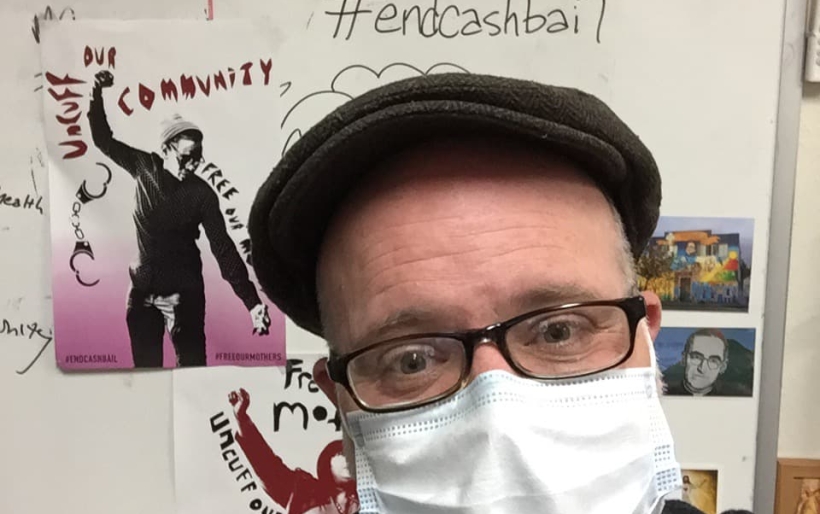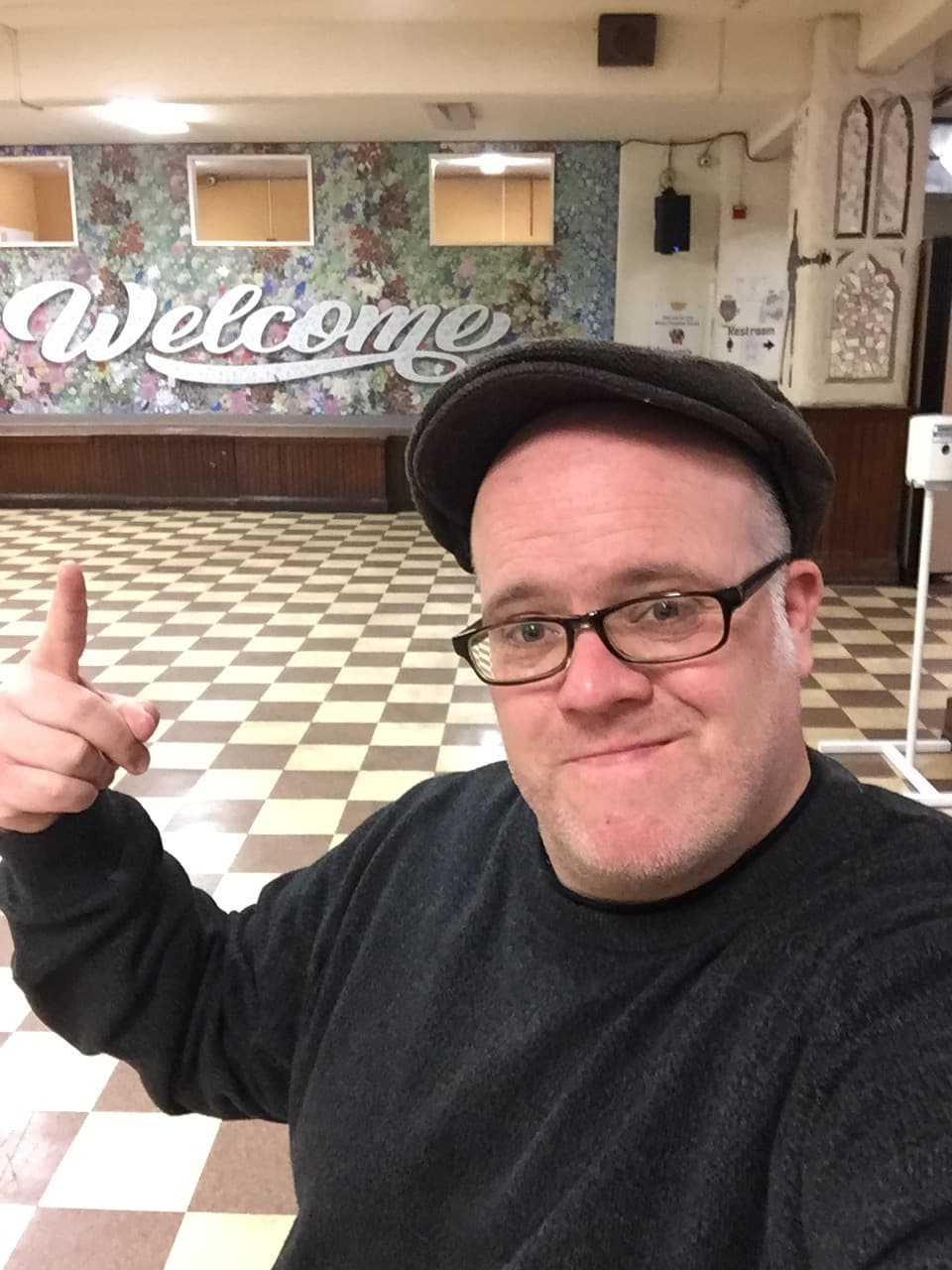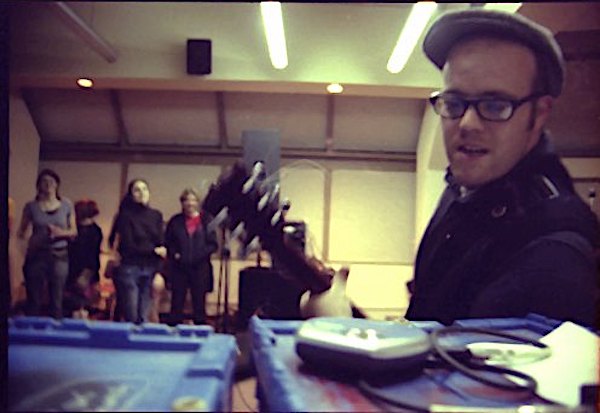
Mike McKee | photo courtesy of Mike McKee
This is Essential: Mike McKee
During the coronavirus pandemic most people have been forced to work from home or, worse yet, they’ve been laid off or furloughed. But not everybody. We decided it would be interesting and important to shine a spotlight on some of the essential workers who are also members of our music community for a new series we’re calling This Is Essential.
One of the first things Broad Street Ministry’s Mike McKee mentions in our interview is that, because of the ongoing COVID-19 pandemic, he’s currently “wearing a couple of different hats” at the Center City-based homeless advocacy organization. As someone who has moved seamlessly through so many circles over the past almost three decades of being involved in music and activism, having to last minute take on extra responsibilities feels very much par for the course for the 40-something year old Ardmore native.
While musically he might be best known as the singer of late-90s political hardcore group Kill The Man Who Questions, McKee has played in a variety of bands ranging from an early iteration of Philly street punks The Boils to the catchy indie rock of Amateur Party to most recently Armalite, a veritable supergroup with members of Lifetime and Atom and His Package.
His career path has taken a similarly circuitous approach, with time spent working for Veterans for Peace, the Free Chelsea Manning campaign, a couple different stints at the First Unitarian Church (upstairs, not down), as a publicist, and even as a music journalist for publications including the late, great Rockpile. Although his current position at Broad Street Ministry is Director of Re-Entry Services, he’s also served as a concierge – their term for a case manager – and been responsible for a ton of programming at the non-profit.
What’s the connecting thread through all this? McKee himself. Read on to find out more about him and Broad Street Ministry, an organization whose motto of “radical hospitality” is what McKee called “an inversion of the usual way of doing things.”
The Key: Let’s start off with the basics. What’s your current position?
Mike McKee: Well, I’m kinda wearing a couple different hats right now. When we’re not in a pandemic I am the director of a small reentry program which works with folks who are in jail or prison before they come out and [then] when they do come out to support them through that difficult transition. You know, connect them with services or whatever it will take for them to reach the goals they have and on the best of days also amplify their voice and experience.
In the middle of pandemic, where we don’t have all of our staff, I’m also packing lunches and sorting mail alphabetically and mopping the floor and finding seasonal workers who can come and round out our team. So I’m doing all sorts right now.
TK: And what’s your current stress level?
MM: There have been other moments [this year] where I’ve certainly been way more overwhelmed, honestly. Because the less time we’re open to the public, the more time I can do my administrative and project management work. So this actually – weirdly – is less stressful in some ways.
TK: How have things changed in the past month?
MM: Well, I guess the two big takeaways are that we generally average around 370 people for a meal and over the past two and a half weeks alone we’ve seen that go from 370 to 500 to 560 to 600 to 700. So there’s definitely more folks coming in need of a meal, partly because there are fewer places that usually provide food. A lot of those are closed up. So we kind of quickly became one of the few places in Center City at least where folks can get something to eat.
And then the flip side to that is that we’re meeting a lot more of our neighbors for the first time because more and more people need to rely on a small church that gives out food just to have one meal a day. So there’s that.
Another thing that’s changed is that there are finally more people’s cases being reviewed for early release from jail or prison. So what makes my job in particular a little bit more different is there are more people coming home from jail or prison and they’re coming home into, well, sometimes no home. They’re coming back to Philadelphia and, you know, that’s a disruptive or challenging transition in the best of days. So right now I can only begin to imagine how disorienting that is when you’re trying to get all these things done that are connected with absolute basic life needs like food, emergency shelter, clothing, an ID which opens the doors to most other things. And most offices are closed. So that’s what’s different for me.
Folks coming home from jail or prison are always in a very challenging situation but [it’s] more challenging than ever now. There’s less resources for them. There’s no prison in-reach, I can’t go inside and meet people ahead of time and it’s much harder to do the kind of face-to-face time together that really helps build trusting relationships.
TK: That makes sense, unfortunately.
MM: The other challenge is that we’re trying to find ways [to interact] that really do feel dignified, non-transactional, and relationship-based for when face time is something we have to be really sparing and careful about.

TK: How have you been dealing with social distancing in a space that basically encourages the opposite of that on a regular basis?
MM: Yeah, that’s definitely a big concern. Although I left this part out [before]: a month ago we recognized pretty quickly we couldn’t maintain all of our services that we usually do so we dropped down just to sustain the mail, the meals, our clothing bank for emergencies, and giving out personal care items and feminine products. When our numbers began to climb, what we did was shift our meal to a to-go service up at City Hall.
The only people who are coming into our actual building at Broad Street Ministry are people who are coming to collect their mail, for the most part. It’s also a place that people sort of just find themselves washed up on to be like, “Yo, where do I get help with X Y and Z?” But yeah, we don’t have 700 people coming into that building. It’s still a lot of people but they’re not all in there at once.
TK: It’s good that the city allows you to set up at City Hall like that.
MM: Oh, sure. I think I would be doing it anyway. But it’s better to have that space rather than have our team be arrested every day like Keith McHenry [ed. note: legendary oft-arrested founder of the organization] of Food Not Bombs.
I’m also aware that even though there are elements of the job that are sort of tough that a) I’m really blessed and lucky to be in a job and b) I’m speaking from a place of privilege. We are a pretty established small to mid-sized nonprofit and I know that there are people who want to do this kind of work outdoors or like sort of street outreach-style and I’m sure it’s really hard for them to have to stop [because of the pandemic.] They’re faced with that need but they have to balance with what feels like the safest public safety move. So if anything I feel really grateful that we’re still able to provide some semblance of structure that’s familiar for people. I think that, in and of itself, is helpful when it feels like the world’s upside down.
TK: You’ve been involved in DIY punk for about 30 years. In what ways did that influence who you are, especially early on?
MM: Playing in bands or more importantly being connected to an underground punk scene – but especially touring – really afforded me a lot of experiences that I don’t know I would have had here at home. I think sometimes it’s easier to step into a place as a guest because people really just receive you in a different way. Even though I was hanging out all the time [in West Philly] across the street from things like the A-Space, Books Through Bars, and so forth, that can feel a little bit intimidating, especially when you’re younger.
So touring was a big deal for me. Touring gave me fresh eyes to see how people in their own environments and in their own communities were responding to things. To this day some of my most vivid memories of touring have little to do with what happened on stage and more to do with being invited before the show to go join a rally in favor of community radio in Berkeley or defending a squat in Copenhagen or answering people’s questions about, like, “One of the women from MOVE is coming here to Paris next week, you’re from Philadelphia, can you talk about what it’s like there?” Anyway, so that and of course all the anti-war activism that goes with all the wars that never stop.
TK: What did you learn from punk and DIY that you’ve been able to apply outside of that?
MM: I think the packaging of some of those first experiences of real organizing or activism, of mutual aid, were tied with punk and that that was the right lens for me. I think there’s a sort of respiratory relationship there in terms of inhaling and exhaling. Like, this is the lens that made sense to me, this is the lens that informs how I can do this kind of work better going forward.
To zoom out a little bit: I think the ethos of DIY punk, at least as I understood it, wasn’t tied to style or packaging or gesture. Kristen Thompson, from the band Tsunami and the Simple Machines label, I interviewed her for something and she used the phrase “the moment where or the practice where you feel you get better at recognizing the revolutionary gesture from the revolutionary act,” which always stuck out to me. And punk was sort of the arithmetic that let me work that out for myself, I guess.
TK: For me punk has always been much more than the music. The music is a crucial component but it’s much more a coalescing of politics, community and culture.
MM: That’s a really eloquent way of putting it. I don’t really know what I was so angry about at 14 years old. But I think a lot of people are very angry in this world for very good reasons, although they don’t always understand why. For better or worse I think punk has shown itself to be one of many really good tools for helping people recognize and develop that sense of “Well, why am I angry? What do I want to do with this anger? Where does it come from and what is it good for?”
I’m sure it will come as very little surprise to you but I always gravitated towards the DC vibe or like the British peace punk side of things. I don’t know if Mark Anderson of Positive Force [ed. note: an activist and music organization in Washington D.C. in the 80s and 90s] came up with the phrase “Isolation is the biggest obstacle to change” but he’s always keen on bringing it back. I think it makes total sense. You don’t know what to do with your anger or your isolation or your despair alone because that’s the whole effect of being atomized. But to process or live those experiences out through encounters with other people who are similar to you or in [some] situations really different from you, I think that’s a form of organizing and politicization. And I think punk provides so many opportunities for that.
I think music and bands are the currency of the punk community but they’re just that, they’re just the currency. They’re not the actual community, they’re not the town that punk has built. That’s the scene and that’s the people who are involved and the relationships and what people do with it. That very much to me was a similar intellectual, political, and spiritual vocabulary in how I arrived at my job or maybe more importantly what I feel is my vocation.

TK: That phrase “Isolation is the biggest barrier to change” I looked it up and in an interview Mark Anderson explains that it was something Chumbawamba said, so you’re still in good company. Where do you see that in action at Broad Street Ministry?
MM: People who are poor or people who are kept in poverty through violence are told, at least in America, that it’s because of a moral personal failure. And if you’re in prison, same difference. And if you’re an immigrant, or the wrong kind of immigrant, same goes as well. We both know that it’s completely absurd but unfortunately it’s baked into the cultural fabric of where we live.
What that translates to is this feeling of extreme isolation and loneliness [where] everyone is a person apart from others and [feels] that their failures to live life most abundantly and to have the relationships that they always want are answerable to the same flaws of theirs that mean economic violence, like homelessness and poverty. And obviously all that’s completely absurd [and] is really almost an artifact of trauma, which so many people experience in such profound ways. So the effect is isolation.
Trauma breeds isolation and our social response to trauma amplifies that feeling of isolation. If you’re alone, if you’re just one person going through that, then it’s easy to internalize that perspective that it is your fault somehow. And when people think things are their fault and the world is ugly because they’re ugly, they’re more likely to … I’m not gonna say they’re more likely to accept it, but they’re certainly less likely to know how to respond strategically to it.
So some of the values that made me gravitate to Broad Street are [that] I think they recognize that in a really sharp way, though Broad Street Ministry is certainly not the first or even main organization that articulated ideas of sanctuary or trauma-informed care. But I saw them living it out in a really special way that reminded me of things I’d seen in some of what were the most inspiring iterations of punk to me, like Positive Force in D.C. and so forth.
TK: Final question. What have you been listening to? How has it been helping you deal with what’s going on?
MM: Chumbawamba is always good for fuel for me. You know what song has really been kicking it for me lately, especially in the last two or three weeks? The Robert Wyatt version of “Shipbuilding” which I think more people maybe know through Elvis Costello’s version. In my brain, internally, it’s actually a mix between Robert Wyatt and the Passion Killers’ versions of “Shipbuilding” and that’s because I feel like we’re in a similar moment for different reasons. There’s a thrust to reopen the shipyards, chasing individualistic security at the expense of what could be a moment of real communal solidarity, which I think is exactly what we need to get through this thing with our lives and our souls intact.
I don’t know a song that says that better but every time I hear Trump or any one of his drones talking about how it’s important that we reopen the economy or liberate this state or that state I think of the same thing: “Yeah, sure, you’ll get yours, look out for number one, but you’re doing that by increasing the munitions that are going to kill people.” It’s a little more figurative in our case but the consequences are no less lethal.
TK: What else? Assuming you haven’t just been listening to “Shipbuilding” 24/7.
MM: On repeat in the dark, it’s my version of self-care [laughs]. I can’t think of a record I’ve put on to listen to just because so much of my time I’m on Zoom or phone calls where I can’t have music in the background. But there’s certainly a cloud of witnesses and the voices of some punks past that absolutely I’ve been drawing on. Ignition, particularly their lyric from “Lucky 13” that says “You have to wonder why / The cost of living is so high / When the price of life is so cheap.” That is certainly there as something that keeps me angry but is also a staying force keeping me going. And who am I fooling? I love the stuff from British Isles. So Newtown Neutorics “Living With Unemployment” is another one. I’m lucky enough to have dodged that bullet but it’s an anthem, isn’t it?
